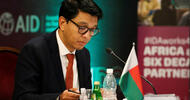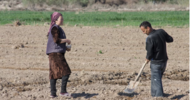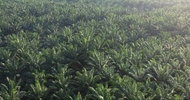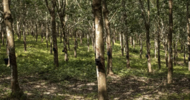Ethiopian Sugar Corp. is tapping loans from Development Bank of China to build six sugar-processing factories and plant 150,000 hectares of sugar cane in the region bordering Kenya. This may exacerbate conflict in the ethnically diverse region.
- Africa Intelligence Media
-
11 Mar 2015
Ethiopia's huge agricultural output has brought about an economic miracle for the nation. But inhabitants are being pushed out of their native land by foreign investors and have no share in the profits.
- Journeyman Pictures
-
28 October 2013
Africa is up for sale by the acre to the highest bidder. But how can rice exports from Ethiopia to Saudi Arabia be justified?
An Ethiopian state body that has been involved in leasing tracts of land for commercial farming has suspended the issuance of new licences until it completes a review because of scant progress in developing areas leased so far, an official said.
Indian companies have attracted global controversy for a spate of large land deals across Africa, yet the Indian Export and Import (Exim) Bank has largely steered clear of directly financing land deals.
Al-Amoudi’s Saudi Star Agricultural Development Plc, which is primarily growing rice to export to Saudi Arabia, has leased 10,000 hectares in Gambella region and is in the “process of leasing an additional 290,000 hectares”.
- Bloomberg
-
27 February 2012
Ruchi Soya Industries, one of the leading edible oil processors, on Friday announced a major farm land acquisition in Ethiopia for soybean cultivation.
- Hindu Business Line
-
16 January 2010
A wikileaks cable discusses the transfer of the Lamu port deal from Qatar to China. Little word about the fate of the 40,0000 ha of farmland promised to Qatar, however.
- Daily Nation
-
10 December 2010
The ministerial Forum on China-Africa Cooperation met in Sharm el-Sheik, Egypt, last week, attended by Chinese Premier Wen Jiabao and representatives of more than 300 Chinese companies.
- World Socialist Website
-
16 November 2009
Video by Alfredo Bini explores the phenomenon of land grabs through the eyes of foreign investors, governments and the people on the land.
- Grassroots International
-
24 September 2014
Large-scale land investment should be seen as an extension of the historical processes of state formation, says this paper from Chatham House
- Chatham House
-
27 January 2012
A group of private Saudi investors plans to invest 375 million riyals to plant wheat, barley and rice in Ethiopia
In addition to these ongoing seven sugar factories, there is also an ongoing private initiative, Hiber Sugar S.C. which will operates on 25,000ha of land in Amhara Regional State at Tana Beles Basin.
- Addis Fortune
-
06 April 2015
African countries that missed out on Gulf cash pouring into agricultural projects elsewhere on the continent are trying to entice Arab investors with deals they say are designed to avoid problems of the past.
After enabling foreign firms to grab vast stretches of land, the government has begun to review its land policy.
- Africa Intelligence
-
27 September 2013
Anywaa Survival Organisation would like to call upon indigenous people to resist this kind of land grabbing effort of the Ethiopian government, now acknowledged by a World Bank report
Official statement of the Oromo Liberation Front declaring the Oromo farmland deals between the Ethiopian government and third parties "null and void".
- Jimma Times
-
02 December 2009
Globe-trotting billionaire Mo Dewji made a fortune in East Africa selling palm oil, rope, and soda. Now he says he's trying to acquire 100,000 ha in Rufiji and another part of Tanzania for sugarcane and cereal plantations.
In an effort to improve food security, the government has been investing in agriculture projects abroad, especially in Vietnam, Cambodia, Egypt, Pakistan, Romania, Sudan and the Americas, to secure food supplies and safeguard against market fluctuations.
- Gulf News
-
20 February 2012
The article suggests the need to render the government a custodian (and not owner) of land in conformity with the FDRE Constitution
- Mizan Law Review
-
29 December 2011
The arid nation of Namibia has a newly discovered aquifer called Ohangwena II, that spans its northeast region, which flows under the boundary between Angola and Namibia, and now the challenge of balancing profit with sustainability looms overhead.
- Future Challenges
-
28 August 2012
Friends of the Earth International warns that voluntary principles on land acquisitions announced by the World Bank and supported by the UN will legitimize and promote land grabbing in Asia, Africa and Latin America.
New report by Oakland Institute exposes the role of the World Bank’s private sector branch, International Finance Corporation, in fueling land grabs.
- Oakland Institute
-
26 April 2010
King Abdullah received today Saudi Arabia's Minister of Commerce and Industry accompanied by two Saudi businessmen Mohammad Hussein Al-Amoudi and Abdullah Hassan Al-Masri on the occasion of the arrival of the earliest produce of their rice to the Kingdom.
- S.Arabia MoFA
-
25 January 2009
The Ethiopian government has denied forcibly relocating tens of thousands of people off their land to make way for foreign investors.
Anywaa Survival Organisation's critique of the Ethiopian government's video presentation of rice land grab in the Gambela region.
The cause of this high level insecurity and loss of innocent peoples' lives is a government policy to take away the indigenous communities land and give it to so called investors both foreigners and Ethiopian highlanders.
The idea of combining the greed of investors with the fight against hunger as a mutually beneficial business venture has failed miserably
- Der Spiegel
-
01 September 2011
The Asian Peasant Coalition and Peasant Movement of the Philippines slam World Bank’s “seven principles”.
- Asian Peasant Coalition
-
29 April 2010
Pakistan's Ministry of Investment has decided to offer more than 7 million acres of farmland for long-term investment to the Emirates Investment Group and others. China and Saudi Arabia are also interested.
- Daily Times
-
02 September 2009















